The A-side is a nice piece of confused garage psychedelia which made the band's name. To wit: it opens with Ellison talking about how confused he is, lost, he needs help! before dumping into refrains using the title. The song also has a quieter verse or bridge, where Ellison croons a bit like a bad Phil May, talking about how sometimes, he cries. Although bassist John Hewlett co-wrote the song with their manager, the recording is actually session musicians with Ellison overdubbed. The B-side is an R&B joke number about a lad named Ernie, credited to "Fingers Groin."
For the UK release, the A-side was renamed "The Love I Thought I'd Found" and the ballad-like section was moved to the beginning, and the drugged monologue to the end. It undercuts the weirdness. The US version was somewhat successful, which makes some sense in the days of popular garage rock. The UK one did not.
John's Children: "Just What You Want - Just What You'll Get" / "But She's Mine" (Feb. 1967)
Bass-heavy pounding A-side, with bizarre grunting hey's in the background. The chorus has some dramatic whispering. I think the whole thing is ridiculous, and pretty funny. (Possibly recorded with session musicians again). The flip is a Who-ripoff with Jeff Beck guesting on guitar and providing an actual solo.
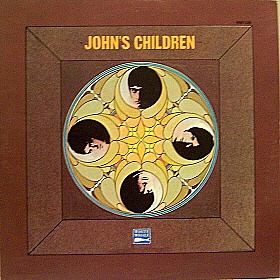 John's
Children:
Orgasm (rec.
1966?, rel. 1970), *
John's
Children:
Orgasm (rec.
1966?, rel. 1970), *Take: one not very good mod band, record an album, then overdub it with the recordings of screaming girls from It's a Hard Days Night. Result: one "live" album, promptly shelved and then dumped out years late. In this age of endless re-evaluation, it is certainly possible to defend this album. I don't fault the band for this . . . unique commercial strategy. But frankly, they sound like a bad garage band, made magnitudes worse by the fake production, and then burdened by the near-constant screaming. The only track (sort of) worth saving is "Smashed Blocked", a single (in its unfettered form) which retains enough verve in this setting to be mildly acceptable as the disorienting odd piece that it is. (The recording is presumably the same as the single, which was Ellison dubbed over session musicians.) Beyond that, there's some bluesy material, downright awful (and unintentionally hilarious) garage-level stuff like "Just What You Want" and "Not the Sort of Girl", and a lot of "what? I can't really hear them." The only band member who demonstrates promise is Chris Townson, whose drumming is as active and intense as any from this period - not quite the Keith Moon School, but heart pumping. But really, even if you were to lessen the burden on this Jacob Marley of albums, you just find some dumpy Who or contemporary Pretty Things knockoffs. Don't.
CD releases include some of their singles, sometimes the clean versions of these songs, which would probably add another full star or so.
John's Children: "Desdemona" / "Remember Thomas A'Beckett" (May 1967)
Their first single with Marc Bolan, who wrote the A-Side. This is pretty good, although pretty unusual. The verses are just one chord, with vocals over them, and an ascending chord pattern. Ellison's singing sounds more natural, Bolan adds some guitar noise, and Townson's drumming is good. The lyrics (implying a teen's visit to a prostitute, I believe) got the single banned from the BBC. The B-Side still had McLelland, and is a pretty decent mod-pop song, totally driven by Townson's marathon drumming, and a nifty attempt by McClellan to add some noise. It shows that the original lineup could have been successful; alas.
John's Children: "Midsummer Night's Scene" / "Sara Crazy Child" (July 1967, unreleased)
When the mod-band goes flower-pop. Bolan wrote the A-side, and it's pretty cool: a space out section, high pitched backing vocals, some guitar anti-solos. The B-Side is less exciting - a slower portrait of the title character. Withdrawn before release.
John's Children: "Come and Play With Me in the Garden" / "Sara, Crazy Child" (July 1967)
A-Side is actually a simplified "Remember Thomas A'Beckett" (i.e., with interesting bits cut out).
John's Children: "Go-Go Girl" / "Jagged Time Lapse" (Oct. 1967)
This really sounds like the Bolan of Tyrannosaurus Rex: underwritten, vaguely retro. Inexplicable organ solo. The B-Side was a recording from Orgasm, sans screaming. It's mod, but not very good.
Andy Ellison: "It's Been a Long Time" / John's Children: "Arthur Green" (Dec. 1967)
The A-Side is a contemplative track done more with strings and horns than a band - it's from a contemporary soundtrack. The flip, by the group is classic power-pop from them, although without any production flourishes.
Andy Ellison: "Fool From Upper Eden" / "Another Lucky Lie" (Mar. 1968)
A-side is a middling pop song dominated by keyboards. I haven't heard the flip.
Andy Ellison: "You Can't Do That" / "Cornflake Zoo" (May 1968)
A-Side is a slow R&B rendition of a Beatles song with backing singers, brass and Ellison's joyous slightly trembly voice. The B side is a bit rougher, which isn't saying much. Junk tune with a Bo Diddly beat and a fake Indian solo at the fadeout.
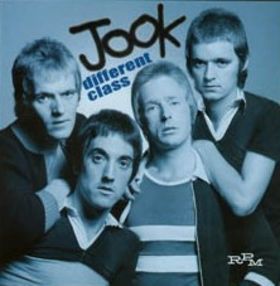 Jook:
Different Class
(rec. 1972-74, rel. 2005), ***
Jook:
Different Class
(rec. 1972-74, rel. 2005), ***The Jook released 5 singles between 1972 and 74; those and a posthumous 1978 EP make up the bulk of this anthology. If pub-rock bands like Dr. Feelgood maintained the no-frills approach of 1964 English blues, Jook partially carried the mod sound of Pete Townshend's slashing 1966 power chords. While The Who's live show strongly diverged from their elaborate albums, Jook was a compatriot of that earlier live show - a band that never left clubs for stadiums. No, they were not slavish torch-carriers (like The Jam's In the City, although I'm teasing) and their music the handclaps and stomping beats of glam (“Oo Oo Rudi” and “King Capp” which is the best of these). (Sometimes it sounds like Pete Townshend tossing off an urban football anthem.) They were probably well served by the single format, which favored more of a no frills approach. You can hear passing trends in the music, be it the same rural streak found on Who’s Next (“Do What You Can”) or the coming ascent of pub-rock (“Crazy Kids” sounds like a lost Nick Lowe power-pop song,“City and Suburban Blues”, the retro 50s feel in “Bish Bash Bosh”). But the songwriting isn't quite there; guitarists Ralph "Ian" Kimmet and Trevor White have talent - but they tend to over-rely on thumping riffs ("Alright With Me", "Bish Bash Bosh") in their attempts at Instant Post-Mod or Glam Anthems. The band had talent, so nothing sounds bad per se, but some tracks sound tossed off (a cover of “Shame Shame Shame” which could have been in the Who’s repertoire in the late 60s, “Jook’s on You”, “Rumble” sounds like The Small Faces to me for some reason).
A final recording session from 1976 yielded four tracks for an EP, and this material is probably the strongest, boiling the band’s sound down to loud guitars, power chords and sometime vocal harmonies, heralding the mainstream revival a few years later. It includes the band’s only great song - "Aggravation Place" which goes for angry, urban power chords instead of clomping and gimmicks, and “Different Class” and “Everything I Do” are also fine songs.
The band broke up in 1974, with White and bassist Ian Hampton joining Sparks. (Hewlett managed both bands).
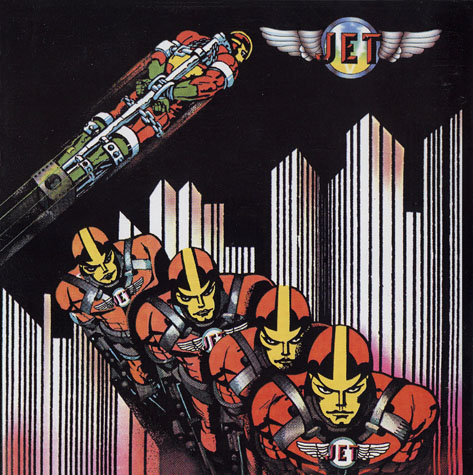 Jet (May 1975),
****
Jet (May 1975),
****I'll admit it: I only created this page so I could talk about this album. This Marginal Rock Figures All-Star Team released a lost glam rock classic which is a lot of fun. The Maels kicked bassist Martin Gordon and keyboardist Peter Oxendale out of Sparks, and they turned around and formed Jet with Townson, Ellison and Davy O'List (who had been in Roxy Music briefly). Jet owes an obvious debt to Kimono-era Sparks with its rhythm piano and kitschy vocals backed up with loud guitar. But there are strong differences: Jet is far more rock-oriented and not as diverse than Sparks. O'List power-chords like he's in a coliseum, Andy Ellison exaggerates his diphthongs to give a positively bitchy vocal performance (as opposed to the cabaret styles of Russell Mael) and Oxendale uses a variety of keyboards and sounds (organ, mellotron, etc). But bassist Martin Gordon is likely the reason Jet succeeded (artistically) where the other projects on this page scuffled. He wrote almost all the songs, and his melodies are catchy and his lyrics often bitchy and clever ("Nothing to Do With Us" about, well, social situations, "Tittle Tattle", the bad date of "Fax N' Info" or the misunderstanding in "Diamonds Are a Girl's Best Friend"), and has a strong lyrical voice. They were well served by producer Roy Thomas Baker, who was working with Queen at this time, and brings the same level of bombast: loud guitar, mellotrons, repetition, the works. For this is really a Loud Rock album with a prominent kitsch factor, like a catty Slade. Most of the album does a good job of taking a big rock sound and using for pop purposes: "Start Here", "Brain Damage", "Cover Girl" among them. There are some hints towards the music revolution coming - the heavy power-pop of "Cover Girl"; little wonder that Gordon's lyrics turned a bit nastier and the band evolved into the more ripping Radio Stars. Yes, it was the mid-70s, so the songs often run a minute or two longer than necessary, but the only real weak spots are "Song for Hymn" which goes towards the vacant side of Gordon's lyrics or the goofy nonsense of "Whangdepootenawah". But more important the album is just a lot of fun and energy, and (at least for me) very suitable for multiple listenings.
CD releases include the B-side "Quandry" which is as essential as the rest of these songs. There are also collections of demos, radio tracks, etc. called More Light Than Shade.
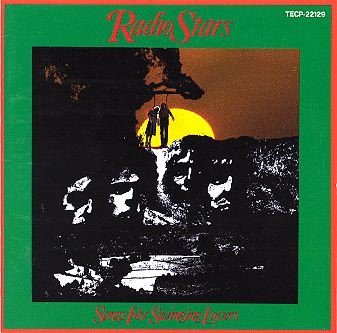 Radio
Stars:
Radio
Stars: 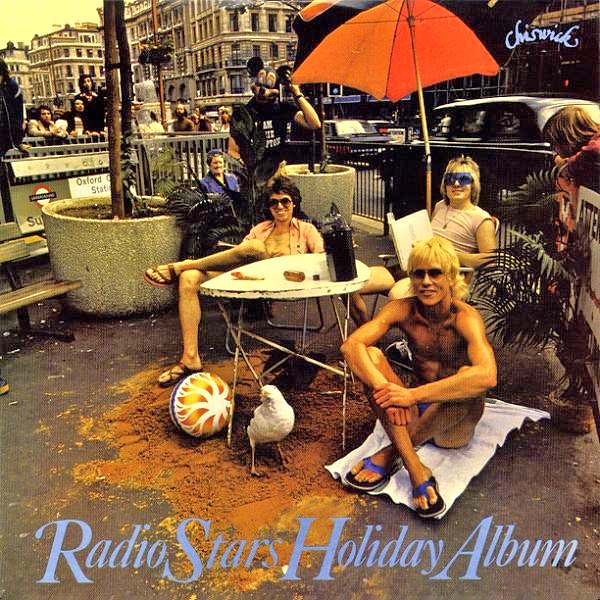 Radio
Stars:
Radio
Stars: